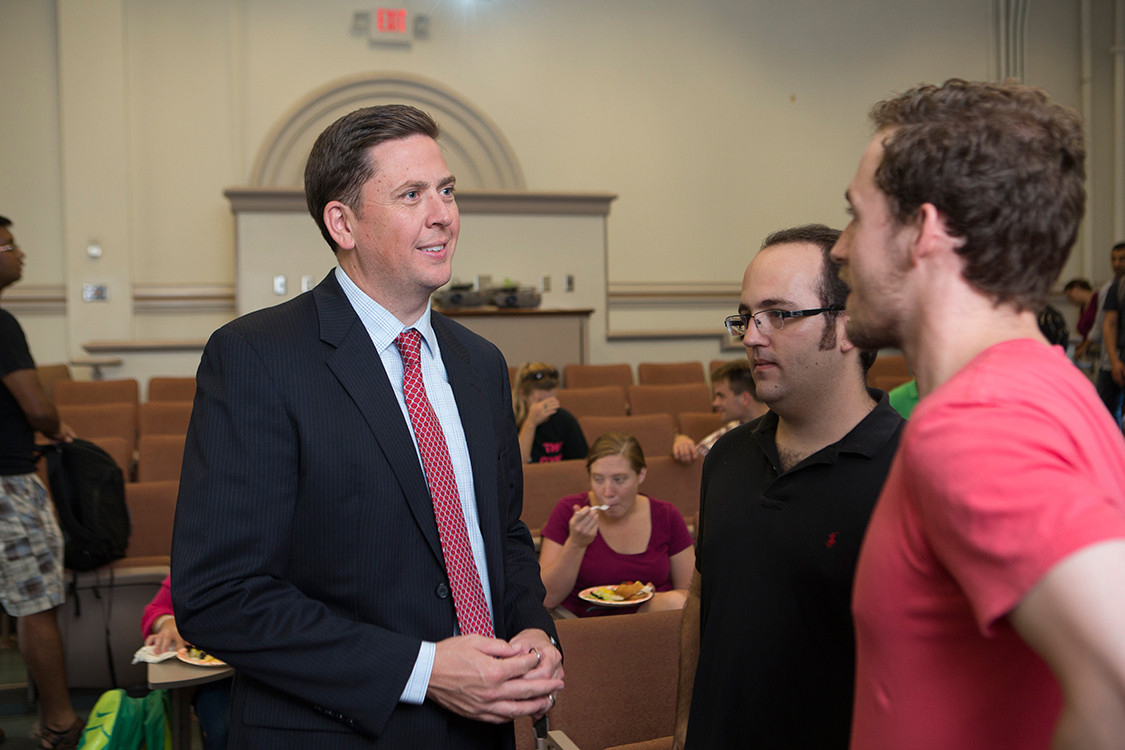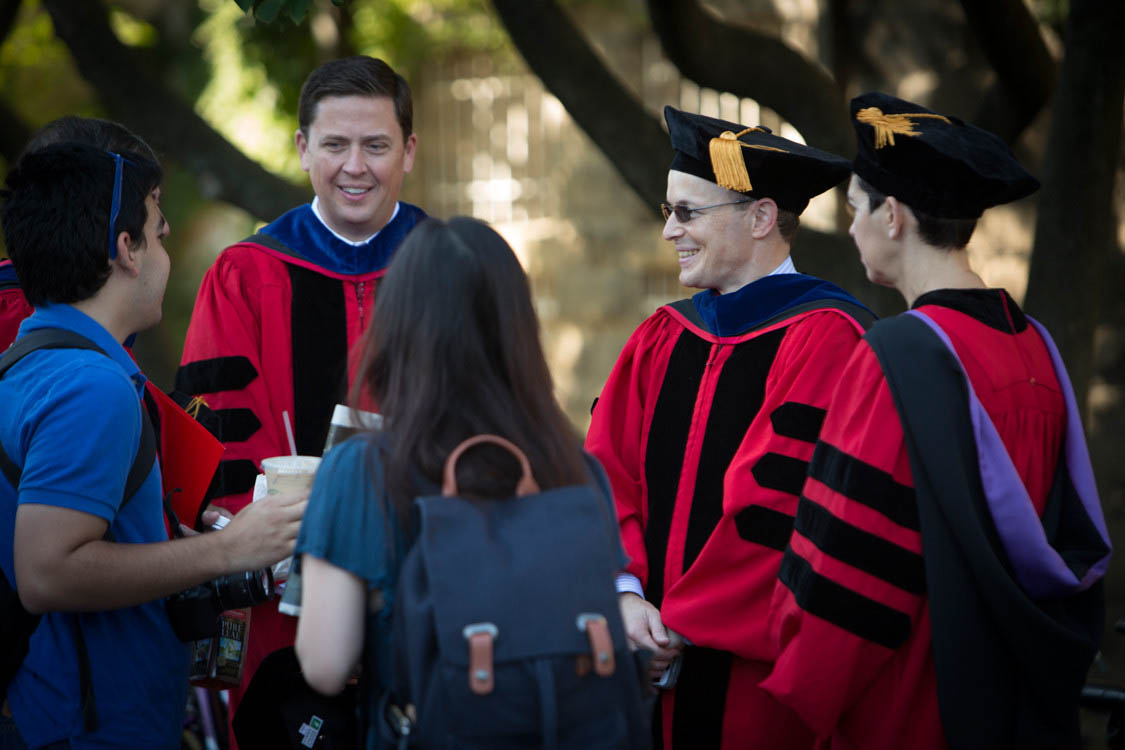Ryan Lombardi: What it means to be a cohesive community
By Joe Wilensky
Ryan Lombardi, who became Cornell’s vice president for student and campus life last August, discusses what it means to form a “cohesive community,” the university’s new housing initiative, mental health on campus, the future of Greek life at Cornell and more.

What have you found most remarkable about Cornell students? What challenges do they face?
I have thoroughly enjoyed my interactions with students here at Cornell. That was one of the two reasons I decided to come here. The first was my interactions with President Elizabeth Garrett and my belief in her leadership. The second was seeing Cornell students’ passion for what they are doing and their love for this place, as well as their sheer intellectual aptitude. Their desire to make the world better and to have a meaningful impact is very compelling for me. They’re engaged, they’re thoughtful, and they want to be a part of solutions.
Cornell students have a high level of social consciousness and a real interest in meaning behind their work. They want to feel a connectedness to their institution, but also to the world and to their communities. They have a values-based compass, and I find it incredibly refreshing that they believe we can, in fact, solve the world’s ills.
College students today are balancing an immense volume of information at a different pace and level than I had to do in college. They’re juggling a constant stream of information and news, especially with social media and the way the world moves right now. They process that information while pursuing deep study at the same time.
They want to be engaged with the social problems of our world – the racism that still exists in the United States is an injustice and an outrage to many of our students, faculty and staff, including me. Our students want to fix these structural and systemic issues, and I look forward to doing so with them.
It’s one thing to assemble a diverse population of people and put us all together here in Ithaca; it’s another thing for us to integrate, understand and learn around our differences, define our commonalities, and truly become a cohesive community. That’s where we still have work to do. That’s been very high on our students’ minds, and I applaud them for that. I think we can be a national model for inclusive communities in higher education.
What are we doing well to shape the undergraduate student experience?
The breadth of what a student can engage in on this campus, from a curricular perspective, is really quite mind-boggling, and it truly does live up to Ezra Cornell’s vision. That breadth – and the mentoring I’ve seen between faculty and students and between staff and students – is very powerful and transformative. A deep, genuine interest in doing the best we can on behalf of our students, trying to serve them in the best way we can, that is something I think we do very well. And as much as the students are, we, too, are constantly thinking about how we can do things better.
Tell us about the housing master planning process you have begun.
As the undergraduate population at Cornell has grown, Student and Campus Life has a responsibility as the providers of on-campus housing to develop a plan that meets current and future housing needs and evolving program priorities. Our local community is also undergoing its own analysis of local housing conditions and shares our keen interest in providing affordable housing. Developing our own plan is one way we are actively partnering to explore solutions for housing issues for the campus and larger Ithaca communities.
Our students have expressed many concerns about student housing. The vision of all first-year students living on North Campus was fundamentally an incredibly strong and powerful decision. I think we need to evaluate it and make sure the way we’re applying it today still meets the principles that were established when it was put in place. We should make sure the program houses are right-sized and that we’re supporting students through those houses. And we need to do the same evaluation for West Campus.

We should ask ourselves, in 2016 are we serving our students in the best way? Are we facilitating their academic success, are we facilitating their personal development? How are we helping students transition to off-campus housing? How do our on-campus housing offerings influence the market in Collegetown or around Ithaca? Are there unintended consequences to the decisions we’ve made? Does our housing meet the goals of fostering an engaged community and promoting a sense of personal connection to the university?
We’ve recently launched a housing master planning process that will look broadly at all of these issues, and we hope to conclude the process in the fall of 2016. The students need to be heavily involved in this discussion. We need to create a roadmap to guide master planning for housing for the next 10-15 years. If we do this well, much of the community conversation, programmatic conversation and philosophical conversation will take place in the spring semester, and the financial analysis – including how to tackle our housing deferred maintenance costs, which are quite extensive – will happen in the summer.
How is Cornell fostering strong mental health as a continuing priority, and what is university leadership doing to address sexual assault?
Regarding mental health, I believe the pressure of being a Cornell student, and of being a student in higher education today, is very high. We have an obligation to provide excellent services – therapy, psychology and psychiatry – but we also need to focus very strongly on the community and the culture that permeate this campus.
We talk about a “caring community,” but what does that really mean? Do we take the time to check in on our neighbors and the people around us? Do we ask our colleagues how they’re doing when we notice they’re stressed? Do we give them help when they need it? Do we show compassion and care for each other? Do we foster a spirit of collaboration as opposed to competition among our students?
We need to walk the walk. I’ve challenged some members of this community to make sure they’re being thoughtful in that regard and not perpetuating a competitive atmosphere.
Addressing sexual violence on campus remains a top priority, and this need was underscored by the recent Association of American Universities survey, both nationally and on Cornell’s campus, of a pervasive culture that makes people feel like they can prey on others. And that’s just not OK. This comes back to the general ethos of our community and our care and decency and human respect for each other, especially when we see some segments of our population – our gender nonconforming students, our transgender students and our LGBTQ students – being disproportionately affected.
We’re always thinking about how we can do more in terms of education and prevention. We’ve enlisted the help of three public health fellows, recent graduates from Cornell, to make sure we’re conducting population-level interventions that will really work with today’s students.
Are you and President Garrett committed to continuing the Greek system at Cornell? Where do we stand on the eradication of hazing?
President Garrett and I are both very supportive of a strong, robust Greek system; we think it can have a very meaningful place on a college campus.
The Greek system nationally has struggled recently to figure out what its place is on a college campus today. My challenge to our student leaders, to our students in the Greek system and to our alumni, quite frankly, is: Let’s be a model for what the Greek system can be nationally. I’d like to see our organizations enhance their own standards and continue to engage heavily in leadership, philanthropy and service.
The Greek system today is and has to be different than it was in the past. We need to make sure we’re doing what’s right by today’s college students, not by past standards. Alumni support and engagement is absolutely critical and is welcomed, and students today also need to create the experience for themselves.
As for hazing, although the Greek system is commonly cited as the source and the location of hazing, it goes well beyond the Greek system. I was very engaged in musical organizations and other types of organizations in college; hazing happens in those organizations, too, not just in fraternities and sororities. At Cornell, Greek organizations have made a strong effort to combat hazing. I hope that our students care enough about each other not to subject their peers to any of this behavior.
What opportunities do you see for alumni to be most constructively engaged in student life at Cornell?
Cornell alums have really welcomed me into the community, which I’ve been incredibly grateful for. I definitely want to recognize and acknowledge the generosity of those alumni who engage regularly with today’s students, who give them mentoring and career opportunities, and who give generous donations to support our work. Many of our programs simply would not be possible without their donations of time, talent and treasure.
Alumni support is valuable, and their experiences can help us think about and shape the student experience for today’s students. And alumni – through their resources, their passion and their volunteerism – can help our students connect to the world after they graduate from Cornell.
What drew you to student services and Cornell in particular?
The most important thing to know about me as I approach this work is that I believe in the value of cultivating human relationships. I’m focused on each individual student having a meaningful and transformative experience at this university. I try never to lose sight of the reason we exist, which is to support our students and work with them.
That kind of student-centeredness and engagement with students, wanting to meet them where they are, to be in their space and to understand them, is really what I bring to the table.
I have found students to be receptive to that approach; the relationships I’ve developed with them in a relatively short time have already been quite powerful for me and are the most rewarding aspect of being a part of this community.
Media Contact
Get Cornell news delivered right to your inbox.
Subscribe